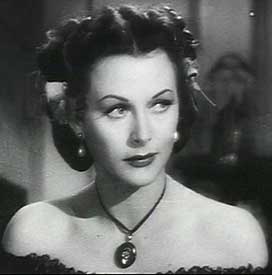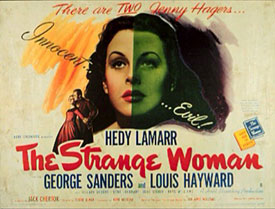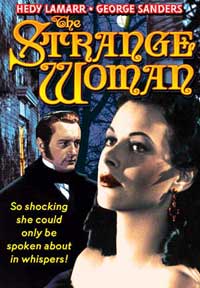 Raised wild without a mother & only an alcoholic father, Jenny (Hedy Lamarr) to escape her abusive father marries Isaiah (Gene Lockhart), a well-off gentleman older than her father.
Raised wild without a mother & only an alcoholic father, Jenny (Hedy Lamarr) to escape her abusive father marries Isaiah (Gene Lockhart), a well-off gentleman older than her father.
She remains enamored of her husband's age-appropriate son Ephraim (Louis Hayward). When she & Ephraim were children, Jenny used to bully him, & once nearly drowned him as a prank, inducing his lifelong fear of water. He is sufficiently masochistic that he has loved her his whole life.
The Strange Woman (1946) is set in the early 1820s or 1830s in Bangor, Maine. It's a melodramatic love story that veers into film noir femme fatale territory.
Jenny though a hellion as a child attempts to live as a dutiful wife & do good works through the church, & usually seems quite sincere about it. But she cannot resist her childhood sweetheart.
Bangor has become a riotous seedy town of sailors & lumberjacks. Isaiah is a lumberman who is being pressured by the community to establish some kind of police force to tame the port town & keep his workers in check.
 One day just before Isaiah sets off to the forest camp, Jenny tempts Ephraim with promises of a life together if he will kill his father. One day just before Isaiah sets off to the forest camp, Jenny tempts Ephraim with promises of a life together if he will kill his father.
Ephraim is incapable of doing this, but he has a terror of drowning, & when a canoe upturns & he & his father are tossed into the river, Ephraim's panicky behavior ends in his father's death.
Ephraim is guilt-ridden that his cowardice caused such harm, & fearful that Jenny's seductiveness caused him on a subconscious level to kill his father on purpose.
Jenny far from delighted is horrified. Plus she is by now much more enamored of her late husband's tall strong handsome foreman John (George Sanders), a better man than Ephraim in every way. Ephraim becomes the town drunk, & Jenny proceeds to seduce John away from the arms of her best friend Meg (Hillary Brooke).
Though Jenny is a harmful presence in the town, except for the scene where she tries to tempt Ephraim into killing his father, she usually seems to be trying to be the good person. It is the cultural unacceptability of her having her own sexual needs, rather than some innate evil, that lends her the semblance of a femme fatale.
Heddy Lamarr's performance comes off so similar to the character of Tara in Gone with the Wind that's it's certainly no surprise she was up for that very role. The story itself feels stripped down with something missing, but it might have provided the structure for a film as good as William Wyler's Wuthering Heights or Orson Wells' The Magnificent Ambersons. Alas, it is instead a minor film overall, but even so worthwhile.
copyright © by Paghat the Ratgirl
|

